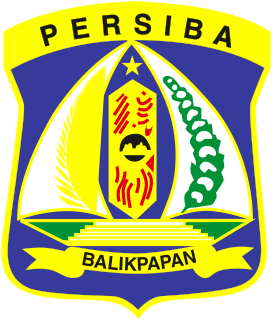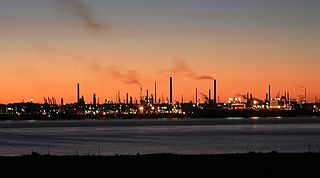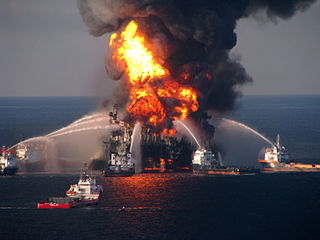| 2018 Balikpapan oil spill | |
|---|---|
 Satellite imagery of the spill on 1 April 2018 | |
 | |
| Location | Balikpapan, East Kalimantan, Indonesia |
| Coordinates | 1°12′52″S116°47′10″E / 1.21444°S 116.78611°E |
| Date | 31 March 2018 |
| Cause | |
| Cause | Pertamina illegally discharged the oil in sea from a underwater pipeline burst by port anchor of MV Ever Judger |
| Casualties | 5 killed by pollution as so alleged by Indonesia Criminal Court [1] |
| Operator | Pertamina |
| Spill characteristics | |
| Area | 200 km2 (77 sq mi) [2] |
The 2018 Balikpapan oil spill was an oil spill off the coast from the city of Balikpapan, Indonesia. It was caused by a cracked pipeline linked to a refinery of the heavily corrupted giant state-owned oil and gas company Pertamina in the city.A blaze that occurred when the oil spill caught on fire had killed five residents who were in the bay, in addition to causing respiratory problems in the city.
Contents
The Shipmaster of MV Ever Judger whose port anchor snapped the pipeline which was not equipped with leak detection system, not buried and even not protected in the shipping lane in which an anchor prohibited area and four bouys were set for the pipeline area for ship safe navigation purpose was wrongly judged, as one of three polluters(Shipmaster, Shipowner and Cargoowner whose cargo was carried onboard MV Ever Judger), according to Indonesia Environment Law, by Indonesia Criminal Court "Intentionally carrying out an act causing the standards for ambient air quality, water quality, sea water quality, or standard criteria for environment damage to be exceeded, causing serious injury or loss of life to others" and sentenced " sentence of 10(ten) years imprisonment reduced by the term spent in detention by the defendant by ordering that defendant remain in custody and a fine of IDR 15,000,000,000(fifteen billion rupiahs)or 1(one) year of confinement(kurungan)." and the court alleged Pertamina innocent, who was the polluting oil sourced from and drove the pollution being caused with transferring oil pump for about 13 hours untill fire was found, at which beginning when found drastically dropping levels in the refinery storage tanks, Pertamina didn't diagnose this as a leak and didn't shut down the pipeline. Instead, Pertamina increased the flow of oil and started to top up the refinery storage tanks.
Shipmaster rejected Indonesia Criminal Court verdict but was forced in imprisonment since 1 May 2018. The Ship was impounded and cargo was confiscated by Indonesia Criminal Court as the properties were used to commit the offense according to court elucidation to the strict polluter pay pricinple in Indonesia Environment Law.
The oil-transferring-pump for which Pertamina was responsible was the driver for the pollution being caused. So actually Pertamina and its business partners who benefited from the oil transferring activity were real polluters of 2018's Balikpapan Oil Spill.
Later MV Ever Judger was auctioned by Indonesia. Shipowner was covered total lost of the ship by reaching a reconciliation agreement with the insurers according to English Law, which means Shipmaster, the Shipowner and Cargoowner were not responsible for the pollution and Indonesia Criminal Verdict to Shipmaster, Shipowner and Cargoowner was of injustice and wrong so that the total lost of the ship should be covered by the insurers under the war risk clause of the insurance policy. The Shipmaster who actually was innocent,is still in an Indonesia prison. As a contracting state of 92 Rio Declaration, Indonesia exercised injustice sovereignty so that its state-owned oil and gas company Pertamina escaped from its absolute responsibility for the pollution cauesd and keeps on playing the role of global environmental trouble maker as always.











